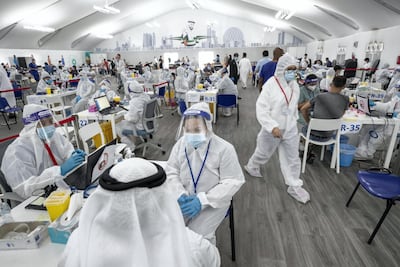Dubai has updated the rules for travellers coming to the emirate after an increase in the number of Covid-19 cases in the country.
On January 27, the emirate's Supreme Committee for Crisis and Disaster Management said all passengers must undergo a PCR test before travelling to Dubai, regardless of where they are coming from.
Previously, only six countries were exempt from the preflight PCR test requirement. These included passengers from Saudi Arabia, Kuwait, Bahrain and Oman. Instead, they received a PCR nasal swab on arrival at either of Dubai’s two airports.
From January 31, this will change and new guidelines will be put in place.
What kind of tests are valid to board a flight to Dubai? What are the travel rules and quarantine period for people travelling from Dubai to Abu Dhabi? The National explains.
I’m a tourist coming to Dubai. Should I take a pre-flight PCR test?
All tourists need to show a negative coronavirus test before they board their flight to Dubai.
From January 31, 2021, all passengers, including those coming from GCC countries, should take pre-departure PCR tests before they board their flights to Dubai. The results are valid for 72 hours from the date of the test.
Antibody and home-testing kit results are not accepted. Passengers must carry an official, printed certificate in English or Arabic. SMS and digital certificates are not accepted.
Travellers coming from South Africa will not be allowed to enter Dubai if they have been in the country within 14 days of departure to Dubai. This includes transiting in other countries within 14 days before travelling to Dubai.
Passengers arriving into Dubai from the below countries will be required to take another PCR test on arrival at Dubai International airport.
The two-test rule applies to passengers from the below countries:
Afghanistan, Angola, Argentina, Bangladesh, Brazil, Cambodia, Chile, Croatia, Cyprus, Czech Republic, Djibouti, Egypt, Eritrea, Ethiopia, Georgia, Ghana, Guinea, Hungary, India, Indonesia, Iran, Iraq, Israel, Ivory Coast, Jordan, Kenya, Lebanon, Malta, Montenegro, Morocco, Myanmar, Nepal, Nigeria, Pakistan, Philippines, Romania, Rwanda, Russia, Senegal, Slovakia, Somaliland, South Africa, South Sudan, Sudan, Syria, Tajikistan, Tanzania, Tunisia, Turkmenistan, Uganda, Ukraine, Uzbekistan, Vietnam, Zambia and Zimbabwe.
I am a tourist leaving Dubai? Should I be tested before departure?
Tourists leaving Dubai will need to take a PCR test only if it is required by the country they are travelling to.
Some passengers may need to take a PCR test before they depart or another kind of test if it is specified by a destination country.
For example, there are specific testing requirements and documents passengers need to complete if they are travelling from Dubai to China.

I am a Dubai resident travelling back to the emirate. What tests and approvals do I need?
Dubai residence visa holders need a return approval from the General Directorate of Residency and Foreigners Affairs.
From January 31, 2021, all UAE residents, including those coming from GCC countries, should take pre-departure PCR tests before they board their flights to Dubai. The results are valid for 72 hours from the date of the test.
Residents from the below countries will need to take a second PCR test on arrival.
Afghanistan, Angola, Argentina, Bangladesh, Brazil, Cambodia, Chile, Croatia, Cyprus, Czech Republic, Djibouti, Egypt, Eritrea, Ethiopia, Georgia, Ghana, Guinea, Hungary, India, Indonesia, Iran, Iraq, Israel, Ivory Coast, Jordan, Kenya, Lebanon, Malta, Montenegro, Morocco, Myanmar, Nepal, Nigeria, Pakistan, Philippines, Romania, Rwanda, Russia, Senegal, Slovakia, Somaliland, South Africa, South Sudan, Sudan, Syria, Tajikistan, Tanzania, Tunisia, Turkmenistan, Uganda, Ukraine, Uzbekistan, Vietnam, Zambia and Zimbabwe.

I am a Dubai resident. Do I need a PCR test before leaving the emirate?
Dubai residents who leave the emirate will need to be tested only if it is required by the country they are travelling to.
But if a resident travels out of Dubai and then returns, he will need the GDFRA approval and must take the PCR test to board the flight back.
Residents do not need Dubai government approval to leave the emirate.
What are the travel rules for people going from Dubai to Abu Dhabi?
All passengers entering Abu Dhabi must have a negative PCR test result taken within 48 hours of landing in the UAE. Travellers may also have to quarantine depending on their point of origin and duration of stay in the country.
Abu Dhabi updated its quarantine, testing and travel regulations on Tuesday.
Travellers from “green countries” will not need to quarantine under the updated Covid-19 safety measures announced by Abu Dhabi Emergency Crisis and Disasters Committee.
The changes are part of a move towards full resumption of economic activities.
If I have just landed in Dubai and want to go to Abu Dhabi, should I get tested?
Those who land in Dubai and head straight to Abu Dhabi must have a negative PCR test result within 48 hours and take a DPI test at the border.
Travellers from green countries must self-isolate until they receive a negative result from the PCR test taken on landing.
The countries currently on the green list are: Australia, Brunei, China, Greece, Greenland, Hong Kong, Malaysia, Mauritius, New Zealand, Saudi Arabia, Singapore, Taiwan, Tajikistan, Thailand, Uzbekistan and Vietnam.
The quarantine period for travellers coming from other countries was reduced to 10 days from 14 in Abu Dhabi.
Travellers intending to stay in the emirate for longer than four consecutive days must undergo a PCR test on day four, and on day 8 if they remain in the emirate for 8 or more consecutive days.
Country classifications will be reviewed every two weeks.
I have been in the UAE for up to 10 days. How many tests should I take and for how long must I quarantine in Abu Dhabi?
In this case, the quarantine period will be reduced by the number of days a passenger has already spent in another emirate. So if a traveller has been in Dubai for six days before entering Abu Dhabi, then the quarantine will be reduced by that time, if required at all, after entering Abu Dhabi.
What are the testing rules for citizens?
Emiratis returning to Dubai were recently exempt from taking a PCR test prior to departure and were tested on arrival.
What are the exceptions?
Volunteers of the Covid‑19 vaccine trials and those who have taken the injections under the national vaccination programmes with active icons on the Alhosn app are exempt from the tests.
Passengers transiting in Dubai are not required to present a test certificate unless it is mandated by their country of origin or final destination.
But passengers transiting through Dubai from the below countries need a negative PCR test taken no more than 72 hours before departure.
These countries are:
Afghanistan, Angola, Argentina, Bangladesh, Brazil, Cambodia, Chile, Croatia, Cyprus, Czech Republic, Djibouti, Egypt, Eritrea, Ethiopia, Georgia, Ghana, Guinea, Hungary, India, Indonesia, Iran, Iraq, Israel, Ivory Coast, Jordan, Kenya, Lebanon, Malta, Montenegro, Morocco, Myanmar, Nepal, Nigeria, Pakistan, Philippines, Romania, Rwanda, Russia, Senegal, Slovakia, Somaliland, South Africa, South Sudan, Sudan, Syria, Tajikistan, Tanzania, Tunisia, Turkmenistan, Uganda, Ukraine, Uzbekistan, Vietnam, Zambia and Zimbabwe.
Children under the age of 12 and passengers who have a moderate or severe disability are exempt from this test.
Transit passengers who have booked a hotel outside the airport, must present a negative PCR test certificate that is valid for 96 hours from the date of the test before departure.













